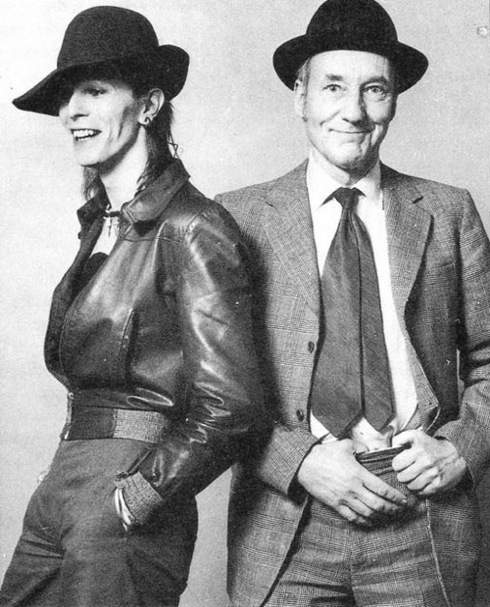So sad to hear of the death of David Bowie, one of the great creative minds of his era and a constant reader. Rolling Stone, the magazine that today publishes Sean Penn’s jungle flatulence, sat Bowie and William S. Burroughs down for a chat in 1974. The two artists may have arrived at a similar place, but they sure came to it from different angles, the rock star as the man who fell to Earth and the writer seemingly escaped from the planet’s core like a mole. In a section that begins with the Ziggy Stardust backstory, Bowie ultimately voices concerns about the Global Village in much the same way that Marshall McLuhan had. An excerpt:
William S. Burroughs:
Where did this Ziggy idea come from, and this five-year idea? Of course, exhaustion of natural resources will not develop the end of the world. It will result in the collapse of civilization. And it will cut down the population by about three-quarters.
David Bowie:
Exactly. This does not cause the end of the world for Ziggy. The end comes when the infinites arrive. They really are a black hole, but I’ve made them people because it would be very hard to explain a black hole on stage.
William S. Burroughs:
Yes, a black hole on stage would be an incredible expense. And it would be a continuing performance, first eating up Shaftesbury Avenue.
David Bowie:
Ziggy is advised in a dream by the infinites to write the coming of a starman, so he writes ‘Starman’, which is the first news of hope that the people have heard. So they latch on to it immediately. The starmen that he is talking about are called the infinites, and they are black-hole jumpers. Ziggy has been talking about this amazing spaceman who will be coming down to save the earth. They arrive somewhere in Greenwich Village. They don’t have a care in the world and are of no possible use to us. They just happened to stumble into our universe by black-hole jumping. Their whole life is travelling from universe to universe. In the stage show, one of them resembles Brando, another one is a Black New Yorker. I even have one called Queenie the Infinite Fox.
Now Ziggy starts to believe in all this himself and thinks himself a prophet of the future starman. He takes himself up to incredible spiritual heights and is kept alive by his disciples. When the infinites arrive, they take bits of Ziggy to make themselves real because in their original state they are anti-matter and cannot exist in our world. And they tear him to pieces on stage during the song ‘Rock ‘n’ roll suicide’. As soon as Ziggy dies on stage the infinites take his elements and make themselves visible. It is a science fiction fantasy of today and this is what literally blew my head off when I read Nova Express, which was written in 1961. Maybe we are the Rodgers and Hammerstein of the seventies, Bill!
William S. Burroughs:
Yes, I can believe that. The parallels are definitely there, and it sounds good.
David Bowie:
I must have the total image of a stage show. It has to be total with me. I’m just not content writing songs, I want to make it three-dimensional. Songwriting as an art is a bit archaic now. Just writing a song is not good enough.
William S. Burroughs:
It’s the whole performance. It’s not like somebody sitting down at the piano and just playing a piece.
Bowie: A song has to take on character, shape, body and influence people to an extent that they use it for their own devices. It must affect them not just as a song, but as a lifestyle. The rock stars have assimilated all kinds of philosophies, styles, histories, writings, and they throw out what they have gleaned from that.
William S. Burroughs:
The revolution will come from ignoring the others out of existence.
David Bowie:
Really. Now we have people who are making it happen on a level faster than ever. People who are into groups like Alice Cooper, The New York Dolls and Iggy Pop, who are denying totally and irrevocably the existence of people who are into The Stones and The Beatles. The gap has decreased from twenty years to ten years.
William S. Burroughs:
The escalating rate of change. The media are really responsible for most of this. Which produces an incalculable effect.
David Bowie:
Once upon a time, even when I was 13 or 14, for me it was between 14 and 40 that you were old. Basically. But now it is 18-year-olds and 26-year-olds – there can be incredible discrepancies, which is really quite alarming. We are not trying to bring people together, but to wonder how much longer we’ve got. It would be positively boring if minds were in tune. I’m more interested in whether the planet is going to survive.
William S. Burroughs:
Actually, the contrary is happening; people are getting further and further apart.
David Bowie:
The idea of getting minds together smacks of the flower power period to me. The coming together of people I find obscene as a principle. It is not human. It is not a natural thing as some people would have us believe.•
Tags: David Bowie, William S. Burroughs

